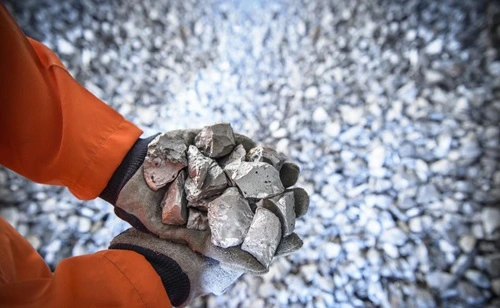Titanium is one of the most fascinating and versatile metals on Earth. Known for its strength, durability, and resistance to corrosion, titanium plays an important role in everything from aerospace to medical implants to everyday items. With its remarkable properties and unique characteristics, titanium is used in countless ways that make it a true marvel of modern materials science. Here are over 10 fun facts about titanium that reveal just how incredible this metal really is.

1. Titanium is as Strong as Steel but Much Lighter
One of titanium’s most remarkable features is its strength-to-weight ratio. It’s as strong as steel but about 45% lighter, which makes it ideal for applications where both strength and low weight are critical. This is why titanium is a go-to material for aerospace, automotive, and sports industries, where reducing weight without sacrificing durability is essential. For instance, fighter jets and commercial aircraft rely heavily on titanium to improve fuel efficiency and performance.
2. Titanium is Biocompatible and Safe for Medical Implants
Titanium is highly biocompatible, which means it’s safe to use inside the human body. Unlike many metals, titanium doesn’t react with bodily fluids, making it ideal for medical implants such as hip replacements, dental implants, and bone screws. The body tolerates titanium so well that bones can actually grow onto it, creating a strong bond. This property makes titanium one of the most widely used materials in medical implants and prosthetics.
3. It’s Named After Greek Mythology’s Powerful Titans
Titanium was named after the Titans of Greek mythology, who were known for their strength and resilience. The metal was discovered in 1791 by William Gregor, a British mineralogist, and was later given the name “titanium” by German chemist Martin Heinrich Klaproth. The name reflects titanium’s powerful properties, such as its remarkable strength, durability, and ability to withstand extreme conditions.
4. Titanium is Extremely Corrosion-Resistant
One of the reasons titanium is so highly valued is its incredible resistance to corrosion. Titanium doesn’t rust or corrode when exposed to saltwater, chlorides, or other harsh environments, which makes it perfect for marine applications. You’ll find titanium used in everything from deep-sea diving equipment to ship hulls to desalination plants. Its corrosion resistance also makes it ideal for products that need to last in extreme conditions without degradation.
5. It’s the Ninth Most Abundant Element on Earth
While it’s considered a rare metal due to the complex process required to extract it, titanium is actually the ninth most abundant element on Earth. It’s found in minerals such as ilmenite and rutile and is primarily extracted from these sources. Although it’s common in the Earth’s crust, turning titanium ore into pure titanium metal requires a multi-step and energy-intensive process, which contributes to its relatively high cost compared to other metals.
6. Titanium Has a High Melting Point
With a melting point of about 3,034 degrees Fahrenheit (1,668 degrees Celsius), titanium can withstand extremely high temperatures. This property makes it perfect for applications where heat resistance is essential, such as in jet engines, rocket parts, and high-performance sports equipment. Because titanium doesn’t deform easily under heat, it’s commonly used in applications that require both durability and resistance to intense temperatures.
7. Titanium is a Popular Choice for Jewelry
Titanium is becoming increasingly popular in the jewelry industry due to its durability, lightweight feel, and modern appearance. Unlike gold or silver, titanium is hypoallergenic, meaning it doesn’t cause skin reactions. This makes it an ideal choice for people with sensitive skin or metal allergies. Titanium rings, bracelets, and necklaces are favored for their sleek look and long-lasting quality, which can withstand everyday wear and tear without tarnishing.
8. It’s Used in High-Performance Sports Equipment
The strength, light weight, and durability of titanium make it perfect for high-performance sports equipment. From golf clubs and tennis rackets to bicycle frames and mountain-climbing gear, titanium helps improve performance while providing extra strength. Its use in racing bikes, for instance, allows for greater speed with less effort due to the reduced weight. Titanium’s flexibility and strength also mean it can absorb impact without breaking, which is a valuable quality in sports equipment.
9. Titanium Dioxide is Widely Used in Sunscreen and Paint
Titanium dioxide (TiO₂), a compound of titanium, is one of the most effective ingredients in sunscreen. It reflects and scatters UV rays, protecting skin from harmful solar radiation. Titanium dioxide is also a popular pigment in paint, giving a brilliant, opaque white that’s resistant to fading. It’s commonly found in everything from cosmetics to paper to food coloring, making it one of the most widespread compounds in daily life.
10. Titanium Has a Non-Magnetic Property
Unlike some metals, titanium is non-magnetic, which makes it useful in applications where magnetism is a concern. For instance, MRI machines require non-magnetic equipment and tools to avoid interference with imaging. Titanium’s non-magnetic quality also makes it useful in sensitive electronics and devices where magnetic interference could pose a problem. This property makes it an ideal choice for implants used in patients who may need MRI scans.
11. It Can Be Colored Through Anodization
One unique quality of titanium is that it can be anodized to produce a range of colors without using paint or dyes. Anodization is a process that creates an oxide layer on the metal’s surface. By adjusting the thickness of this layer, different colors can appear. This characteristic has made anodized titanium popular in jewelry, artwork, and even consumer electronics, allowing designers to use a spectrum of colors without compromising the metal’s durability.
12. Titanium’s Alloys Enhance Its Strength and Versatility
Titanium is commonly alloyed with other metals like aluminum and vanadium to create even stronger and more versatile materials. Titanium alloys are used extensively in the aerospace industry, as well as in the automotive and military sectors, where high strength, lightweight, and corrosion resistance are essential. Titanium alloys are also widely used in medical devices and implants because they are durable and compatible with the human body.
13. It’s Often Used in Space Exploration
Due to its strength, light weight, and resistance to extreme temperatures, titanium is a favorite material for space exploration. Spacecraft parts, rockets, and satellite components often contain titanium, as it can withstand the harsh conditions of space without adding too much weight. NASA and other space agencies rely on titanium to build parts that can endure the rigors of space travel, making it one of the key materials in modern space technology.
14. Titanium is Used in Architecture and Art
Architects and artists appreciate titanium’s durability and resistance to weathering, using it for projects that require a unique, long-lasting material. The iconic Guggenheim Museum in Bilbao, Spain, is famously covered in titanium panels, which give the building a modern, futuristic appearance. Titanium’s resistance to corrosion and distinctive look make it ideal for sculptures and outdoor installations, giving it both an aesthetic and functional role in design.
15. Titanium Has No Known Biological Role in the Human Body
Although titanium is highly biocompatible and used extensively in medical applications, it has no known biological role in the human body. Unlike elements like iron or calcium, which are essential for bodily functions, titanium doesn’t play a role in metabolism or any other physiological processes. However, its inert nature makes it safe for medical use, and it’s one of the few metals that the human body can tolerate without adverse reactions.
From its exceptional strength and resistance to corrosion to its lightweight feel and versatile applications, titanium is a material that has revolutionized multiple industries. Whether it’s in a fighter jet, a luxury watch, or a life-saving medical implant, titanium’s unique properties make it one of the most valuable metals in the world. As technology advances and new uses for titanium continue to be discovered, this incredible metal will likely play an even bigger role in our everyday lives and future innovations.


